BBC's Blog, page 4
January 29, 2014
Ludus Play Along Native Application
Hello, I'm a development producer for BBC Children's. It's my job to work with technical and user experience teams both inside the BBC and out to define, develop and deliver fun and games for both CBBC and CBeebies.
CBBC has just launched its first play along native application for mobile and tablet devices to accompany brand-new show: Ludus which began its first 10 episode run on 20 January. If you missed it, don't worry, the play along also works on iPlayer (we are particularly proud of that detail)

Unlock new games with Ludus
It's not only our first dual screen offering, Ludus marks CBBC's debut in the app space which is an increasingly significant platform for our audience.
To bring our audience both of these "firsts", CBBC worked with Cardiff-based Cube Interactive and Boom Pictures to develop the TV format and app, as well as London-based SyncScreen who have developed a framework around a technology called Civolution to allow mobile and tablet devices to synchronise with video.
Before we get into how that works, to give it some context, I should explain how the show works. It's a game show for children in which the eponymous Ludus is an intergalactic super villain who has kidnapped your friends and family. Your mission? Play Ludus at his own games and win back their freedom.
The core concept of the dual screen format is that you play exactly the same games at exactly the same time as the contestants in the studio. Children really enjoyed comparing their performance on mobile or tablet against the children in the studio. If there are several children gathered round the TV each with a device, it can get very competitive!
The technology that enables the synchronisation between studio players and players at home is from Civolution. The umbrella term for this kind of technology is "audio watermarking" which means the soundtrack to the TV show contains audio information that, whilst inaudible to humans, can be detected by a microphone on a mobile or tablet. You can think of it like a constant pulsing signal throughout the show. Any listening mobile or tablet device picking up the signal can identify where in the timeline of the show it is. This means that if you miss the start, you won't miss out as you can join in any time as long as there are still games to play.
Even better, if you have to mute the TV because you get called for your tea, the app will detect the lack of signal and, after about 10 seconds, trigger a friendly message declaring it's lost the signal and cannot synchronise. Players are then presented with a diagnostic sequence in order to make sure everything is set up to enable resynchronisation. The same thing happens you pause an on demand or recorded episode. Because this is a brand-new way of joining in with CBBC, we needed to make the messaging as friendly and unambiguous as possible.
Ensuring the action on the TV screen exactly matches the action on the screen in your hands is a painstaking process. Each episode requires production of an individual XML configuration file detailing which of the 20+ available games to open and when to open it. Each game allows the player exactly one minute to complete the challenge. Sometimes the studio contestants will complete the challenge before the players at home so the TV team needed to make sure that any home player who needed longer than the TV contestants to complete the challenge didn't miss anything vital from the TV output while they finished.
To give Ludus a life outside of the TV show, we've built in a "play without TV" mode that allows you to practice the games in between shows. And as I said earlier, if you've missed an episode or simply want to play it again, you can join in on iPlayer too.
Ludus is built using Adobe AIR with native extensions to allow it to take advantage of the host hardware, most importantly, the microphone for synchronisation as well as to build to multiple devices from one code base. However, the Ludus app is only available for recent Android and iOS mobile and tablet devices. This is because we wanted to test audience reaction to this new interactive format and make sure it gave our audience an experience they enjoyed and valued before expanding to other platforms.
We are very excited to see how our audience get on with this, and the play along fun doesn't stop once Ludus ends its 10 episode run, children will be able to join in with Horrible Histories Gory Games coming in spring 2014. But that's another blog post for another time.
Until then, if you've played along with Ludus either on CBBC or iPlayer, I'd love to hear what you think so please let me know in the comments.
Simon Cobb is a Development Producer, CBeebies
News Archive Connected Studio: using yesterday to tell better stories tomorrow
A host of rich ideas have emerged from last week’s Connected Studio exploring ways to unlock the BBC News Archive. I had a great time because mixing the ambitious, anarchic, artistic chaos of creative endeavour with a tight deadline always produces interesting results.
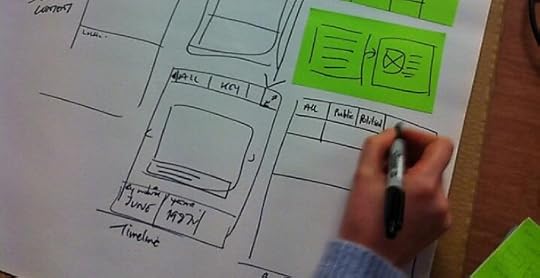
Photo courtesy of Head agency who attended the Connected Studio event
Several themes emerged across the day. Firstly there was real excitement about the potential of archive to give our audiences really potent and immersive experiences. We can use the past to connect with audiences on a much deeper emotional level. The BBC Archive is unique and extraordinary in its depth. So it can be a big part of what the BBC feels like to audiences and what makes it distinctive in the fully digital world.
There was also agreement that we cannot just digitise the archive and hope people find it. We have to curate it and connect it to the things people are interested in now. This throws up fascinating cultural and technical challenges which were wrestled with during the Connected Studio event.
Culturally the BBC has for decades been very prescriptive in what we give our audiences. We decide the schedules, we choose what is important and what facts should or should not be included, but digital audiences want to control their own journeys and instinctively resist being told what to do.
So can we reconcile the two?
Lots of ideas explored ways in which we can. Audiences get to control their own serendipitous journeys into our content within a context curated by BBC Journalists, so experiences remain relevant and rich with public service value.
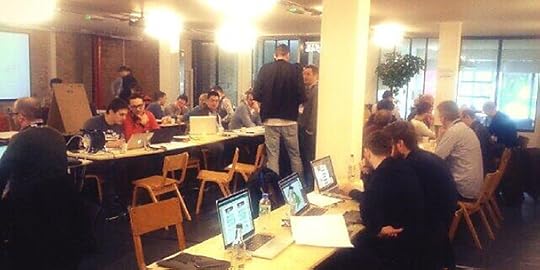
Delegates at the London site
The technical challenges are becoming clearer too. The linked data platform allows us to connect things happening now to relevant events in the past but how can we find the sweet spot between machine and human curation? Lots of ideas also rightly explored the potential to offer more personalised experiences with the News Archive, especially using location technology. This has huge potential given the emotional power of archive to connect people with where they are from, as well as where they are now.
There will now be a judging process and a build studio in Belfast (on the 26th and 27th February) from which prototypes will follow.
So thank you again to all the teams that took part. It was really valuable and fun.
Peter Rippon is Editor, BBC Online Archive
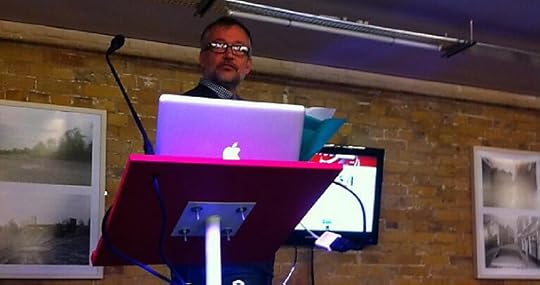
Peter Rippon addresses delegates in London
January 27, 2014
Testing BBC iPlayer: reading XML, JSON response into Java
My name is Gaurav Kumar. I am a Developer In Test in the BBC TV iPlayer team.
I have been with the BBC for just over four months and I work in the iPlayer Business Logic area. I work on the layer that makes sense of the data we receive and puts it into a usable format for iPlayer front-end. This data includes things like scheduling, categories, channel highlights and everything else that drives the front end.
The testing around this is very important as it spans not only two separate teams within Programmes and On Demand but also drives the heart of the iPlayer experience for the end users. This takes a lot of coordination and planning to make sure we capture the changes that come through.
My team works using BDD ("behaviour drive development") and I am co-located with the developers. Within the team we automate as much as we can to avoid manually repeatable tasks but we do also have some manual testing that we run.
This blog-post is based on my experience of testing in iPlayer Business Layer, that is testing a RESTful API. Instead of telling you about the basic principles and mechanics of API testing, I want to talk about a very important aspect of automating API testing, that is reading and verifying the response in XML/JSON format.
Testing of a RESTful API is mainly about calling the web services that return a response and then verifying the data returned in response. The response can either be in XML or JSON format.
I have been writing the automated tests in Java by utilizing its built-in libraries so it’s quite obvious that this post will cover no other language but Java.
First let’s consider an example of a XML response:

In Java there are different ways and XML parsers available to read XML response. I am going to show a very simple and easy way of doing it via DOM XML parser. Let’s create a custom method to make our job easier.
ReadXMLResponse.java
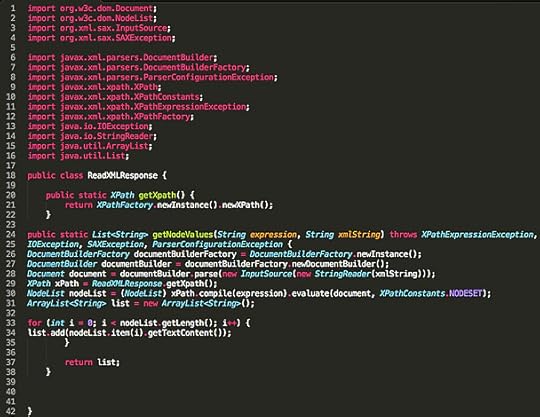
Now we have a method, which can be used to read the value from nodes. Consider that we get the previously shown example of xml response as the response when an API is being called.
Please Note: Here, I am assuming that you already know how to get the API response in one way or another as I am not covering that topic in this blog-post.
Suppose the response body is obtained and is passed to a List URI Variable apiResponse, then we can get the value of any node using the method getNodeValues e.g.
getNodeValues("//title", apiResponse.getContent());
will return the values “FirstExample”, “SecondExample”
Similarly (“//rating”, apiResponse.getContent());
will return the values “100”, “120”
Simple enough?
Now let’s deal with JSON response.
The example I am going to work through is about salaries of people working in a fictional IT department.
Consider the following as the JSON example:

Again there are different methods and parsers to read the JSON response but I find JSON Path as one simplest ways to parse JSON response. In fact it is being said that what XPath is for XML, JSON Path is for JSON.
We need the following import:
import com.jayway.jsonpath.JsonPath;
Now if we want the salary of all staff, we can pass:
Testing BBC iPlayer: reading XML, JSON response into JavaTagged with: iPlayerMy name is Gaurav Kumar. I am a Developer In Test in the BBC TV iPlayer team.
I have been with the BBC for just over four months and I work in the iPlayer Business Logic area. I work on the layer that makes sense of the data we receive and puts it into a usable format for iPlayer front-end. This data includes things like scheduling, categories, channel highlights and everything else that drives the front end.
The testing around this is very important as it spans not only two separate teams within Programmes and On Demand but also drives the heart of the iPlayer experience for the end users. This takes a lot of coordination and planning to make sure we capture the changes that come through.
My team works using BDD ("behaviour drive development") and I am co-located with the developers. Within the team we automate as much as we can to avoid manually repeatable tasks but we do also have some manual testing that we run.
This blog-post is based on my experience of testing in iPlayer Business Layer, that is testing a RESTful API. Instead of telling you about the basic principles and mechanics of API testing, I want to talk about a very important aspect of automating API testing, that is reading and verifying the response in XML/JSON format.
Testing of a RESTful API is mainly about calling the web services that return a response and then verifying the data returned in response. The response can either be in XML or JSON format.
I have been writing the automated tests in Java by utilizing its built-in libraries so it’s quite obvious that this post will cover no other language but Java.
First let’s consider an example of a XML response:

In Java there are different ways and XML parsers available to read XML response. I am going to show a very simple and easy way of doing it via DOM XML parser. Let’s create a custom method to make our job easier.
ReadXMLResponse.java

Now we have a method, which can be used to read the value from nodes. Consider that we get the previously shown example of xml response as the response when an API is being called.
Please Note: Here, I am assuming that you already know how to get the API response in one way or another as I am not covering that topic in this blog-post.
Suppose the response body is obtained and is passed to a List URI Variable apiResponse, then we can get the value of any node using the method getNodeValues e.g.
getNodeValues("//title", apiResponse.getContent());
will return the values “FirstExample”, “SecondExample”
Similarly (“//rating”, apiResponse.getContent());
will return the values “100”, “120”
Simple enough?
Now let’s deal with JSON response.
The example I am going to work through is about salaries of people working in a fictional IT department.
Consider the following as the JSON example:
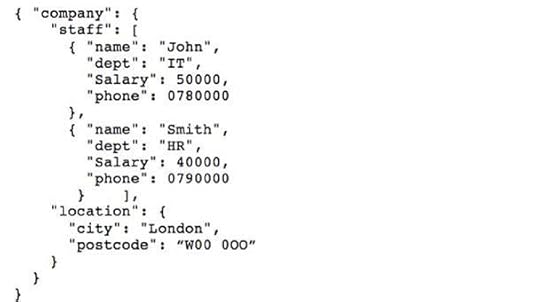
Again there are different methods and parsers to read the JSON response but I find JSON Path as one simplest ways to parse JSON response. In fact it is being said that what XPath is for XML, JSON Path is for JSON.
We need the following import:
import com.jayway.jsonpath.JsonPath;
Now if we want the salary of all staff, we can pass:
List salary = JsonPath.read(json, "$.company.staff[*].salary");
Similarly,
List salary = JsonPath.read(json, "$.company.staff[1].salary");
Will give the salry of 1st Staff i.e. John in this case
For more complex testing scenarios, we can also use something like:
List staff = JsonPath.read(json, "$.company.staff[?(@.salary < 45000)]");
To get staff who are earning less than 45000
Or
List staff = JsonPath.read(json, "$.company.staff[?(@.dept == ‘IT’)]");
To get staff from the IT dept.
Once you are able to get the response from XML or JSON file formats, you can then either assert the values to expected values or use them in other parts of your tests.
I hope you find this post helpful.
Gaurav Kumar is a developer, Test, Programmes and On Demand, BBC Future Media
January 24, 2014
What's on BBC Red Button - 25-31 Jan
We're all over the UK this week as Winterwatch invites us all to join in with the Big Garden Birdwatch. Sports fans can chose from Australian Open tennis, Indoor Bowls coverage, winter sports and transfer deadline coverage. This is our final week on the BBC Internet blog – from next week Red Button weekly highlights will be listed on the About the BBC blog.
Winterwatch Extra
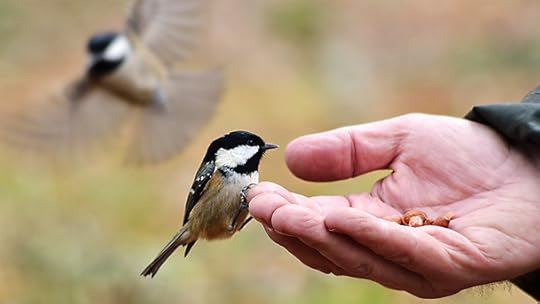
Winterwatch - A coal-tit takes food from a hand
This week Winterwatch turns its focus on the birds that don't migrate for the winter. Iolo Williams reveals the wonderful world of British birds with live cameras from around the UK and interactive shows showing you how to get involved with the Big Garden Birdwatch – the world’s largest citizen science project run by the RSPB.
Wildlife footage will be streamed online, on tablets, smartphones and on BBC Red Button, and it’s accompanied by running commentary from our guest experts.
Sat 25 January, 6am-7am, 9am-11.30am, 12.30pm-2.30pm
Mon 27 January, 6pm-10.25pm
Tue 28 January, 4am-10am, 6.30pm-7.30pm and 10.30pm through the night
Wed 29 January, 6am-10am, 6pm-7pm and 10.30pm-1.55am
Thu 30 January, 4am-10am, 6pm through the night
Fri 31 January, 6am-10am
Sport highlights this week
Final Score and the Football League Show return for Saturday, with an additional Final Score midweek. There'll be continuing highlights from the World Indoor Bowls this weekend and we'll be reserving the best seats for the Australian Open Men's and Women's finals. Get ready for the Sochi 2014 Winter Olympics with Ski Sunday Extra. Meanwhile, on Friday all eyes will be on the Football comings and goings on Transfer Deadline Day.
For a full list and times of sport coverage on the Red Button see the BBC Sport website. Please note times are subject to change.
Extra from BBC Three's Uncle
The second episode of BBC Three's new slacker comedy Uncle began with songwriter Andy imagining himself acting in his own music video. Well imagine no more - catch the full video for 'No Survivors':
Mon 27 January, 10:25pm-4:00am
Thu 30 January, 1:55am-4:00am
Sat 1 February, 1:25am-4:30am
You can keep up with all the latest on Red Button via bbc.co.uk/redbutton or by following us on Twitter @BBCRedButton
Links; Instagram video, Connected Studio, iWonder
Here's some useful information from the past couple of weeks which you may have missed.
"BBC targets social media users with Instagram video news", reports Media Guardian:
"On 16 January, BBC News launched Instafax, a new short-form video news service delivered to Instagram users. The project is a month-long experiment, with three 15-second videos uploaded a day, intended to serve as a roundup of the day's news...
...The BBC is not the first to be testing the value of social media platforms for video news reporting. NowThis News specialises in short-form visuals for social networks including Facebook, Vine, Twitter and Snapchat. It has created Instagram videos in this format since 2012, the same year the site launched..."
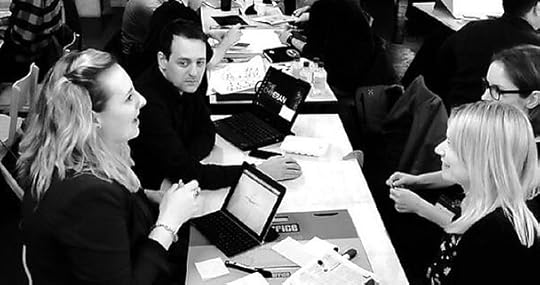
Delegates at the Connected Studio event in Shoreditch, London this week
Connected Studio has been busy. The News Archive Connected Studio this week was extensively tweeted by participants in London and Belfast. The image above was taken by the BBC News Labs team of delegates in Shoreditch.
The Guardian also reports on this Connected Studio project to find easy ways to help children log in ("How your child's art could unlock a more secure online world"):
"Think through all the competencies required to log in to a website. Not only do you have to be able to read and write – in an age of touchscreen computing, not at all something which can be assumed of everyone online – but you also usually need an email address, and frequently a Twitter or Facebook account as well. You must remember a password and type it with no visible feedback other than the number of characters written. And you have to keep that information secret, no matter how proud you are of it...
...Given how many adults fail at those simple tasks, it's a bit much to expect it of the under-10s."
The Connected Studio team issued a Newsletter summarising their work over past year. You can follow them on Twitter at BBC_Connected.
The launch of BBC iWonder was well recieved (see these comments on Creative Review's article, although Tech Digest ran it through a "hype check"). Andrew Pipes blog post about the World War One Interactive Guides is still open for your comments. Tim Plyming outlines more about the project on the About The BBC blog.
From the BBC R&D blog: "The Year That Was - BBC R&D's North Lab Yearnotes"
From the BBC Responsive News blog: "A year as an undergraduate web developer at the BBC".
From Guardian Tech: "Kinect to blame for BBC iPlayer on Xbox One delay, says developer"
From The Daily Mail: "Make iPlayer viewers PAY a licence fee': BBC calls for reforms to deal with 500,000 homes that only watch programmes online."
Finally, the BBC Internet blog's twitter account passed the ten thousand follower mark this week. If you follow us on twitter, thanks.
Nick Reynolds is Editor, BBC Internet blog
January 23, 2014
New version of radio homepage launched
I’m Daniel Bean, Senior Product Manager of iPlayer Radio, in the BBC’s Future Media division.
It’s been over 16 months since we launched the new homepage for BBC Radio at http://www.bbc.co.uk/radio/.
This is what it used to look like:
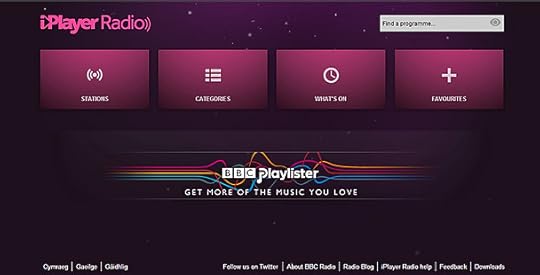
The old Radio homepage
We set out to offer you a very simple homepage where you could quickly and easily get to the right places for your favourite radio, whether it be listening live or catching up on something you’ve missed.
This seems to have worked well. However, part of our job is to try and find out how we could improve things. We look at what users do, listen to their online feedback and comments and see how they respond to our online questionnaire.
You’ve told us you’d like it to be easier to find your way around the radio homepage and navigate to where you want to go. Therefore, on the new version of the page we are launching today we show examples on the page of what each section does. For example, instead of having a button that just says ‘Stations’ you can now see a list of stations underneath the button when you open the page. The ‘Stations’ button on the old radio homepage was by far the one you used the most, so this was an important section for us to get right.
We are also doing more to help users find things they want to catch up on. The most popular categories and programmes are more prominent on the new page and we are linking directly to our selection of programmes, clips, podcasts and events, as many of you were keen for us to give you more recommendations.
The page has had a subtle design makeover which we hope will improve the homepage for you as well as make it easier for you to use. It’s also been built to be responsive, which means that you see the same page on all devices but its elements get rearranged depending on whether you’re using a mobile phone, tablet or desktop computer.
As of today, this is what the new version looks like on a desktop computer:
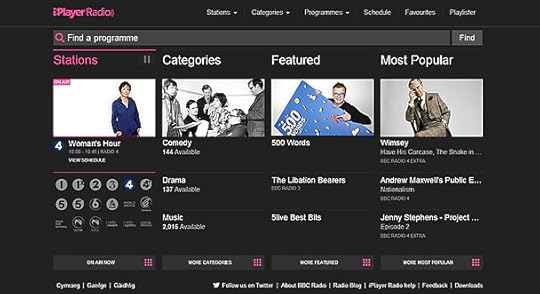
The new Radio homepage
Let us know what you think of the page. We will as always keep you posted on any upcoming changes, and I hope you like what we’ve done so far!
Daniel Bean is Senior Product Manager, iPlayer Radio, BBC Future Media
Sochi Winter Olympics Index Launched
Today we are launching the BBC Sochi Winter Olympics website, which automatically adapts its layout depending on whether you access the site from a PC, tablet or mobile.
This new responsive site will be the home of all BBC Sochi coverage, including 650 hours of live video in up to six simultaneous streams in the UK.

The indexes for the Winter Olympics site on four screens
The Winter Olympics is a massive part of a fantastic year of sport on the BBC which also includes the FIFA World Cup in Rio and the Commonwealth Games in Glasgow taking place in the summer on top of the Formula 1 World Championship and Wimbledon.
Much of the planning and development for these big events takes place in the previous year, so there were a few key decisions to make in 2013.
When deciding what to build for Sochi, we spent a lot of time analysing audience feedback and usage figures from London 2012.
This research showed that being able to follow the live action in video, audio or through the live text commentary were the most popular elements of our coverage, alongside the medal table and schedule so that's where we've also focussed our efforts for Sochi.
The new live page, which will showcase the Winter Olympics live video, radio, statistics and live text commentary, has been evolving since launching in beta last year thanks to your feedback, and will be at the heart of our Sochi coverage throughout the Games.
In the run up to the Games, the new Sochi site will cover the latest build-up news and outline what's happening when in the detailed schedule. Next week we will also add a dedicated index for each of the Olympic sports so that you can follow the latest news on your favourite sport, check the schedule and view the video highlights all in one place.
During the Games, as well as watching the live action, you’ll also be able to follow your country's performance on the medal table and check out the results of every event.
This content is also available in the BBC Sport app for mobiles and tablets, available on iOS, Android and Kindle Fire devices. In the app you can also add the main Sochi 2014 page to your quicklinks and follow live coverage on the go with the Radio 5 Live and 5 Live sports extra radio streams.
If you’re following the action on TV there’ll be up to two red button streams on BT Vision, Freesat, Freeview, Sky, Virgin Media and YouView, offering live content and highlights from Sochi. While those with connected TVs will have access to all six video streams, highlights and headlines through the BBC Sport app for connected TVs and the BBC's Connected Red Button service on Virgin Media TiVo and both Sony 2013 and Samsung 2012 Smart TVs.
Another key decision we had to make last year was how to develop the Sochi site for the growing number of mobile and tablet devices visiting BBC Sport.
We recently saw record traffic from handheld devices to BBC Sport over the festive period and on a typical weekday we receive more than half of all visits from mobile phones and tablets, rising to two thirds at the weekend, so designing a service which is optimised for those devices was really important.
There are currently two BBC Sport websites - a mobile website and a desktop website. Rather than making two versions of every event site we're building in 2014, we have adopted a responsive design approach and have built a single website which will adapt its layout for whatever device you are on.
William Bamford, from our engineering team, will explain more on how the site was built in a blog post in the near future.
We'll also be using feedback about the Winter Olympics to help us add to and improve the experience for the other key events in 2014 so please do let us know what you think.
We're especially interested in learning how you use your mobile and tablet devices as companions to television viewing and I'm keen to hear your thoughts on the subject so please do leave a comment.
Lucy McLean is Executive Product Manager, BBC Sport, BBC Future Media
January 19, 2014
BBC iWonder: Introducing Interactive Guides
Today we’re announcing BBC iWonder, a bold new brand whose mission is to unlock the learning potential of all BBC content.
We know that people's curiosity is often sparked by BBC programmes, and also by the world around them. BBC iWonder is for these curious minds, and at its' heart is a new content format, interactive guides. Guides will invite people to lean forward, and actively explore a range of factual and education topics from Science and Natural History, Arts, History, Religion and Ethics, Food and more. In this blog post, I’ll outline the features of iWonder interactive guides, as well as what to expect from this new format in the near future.
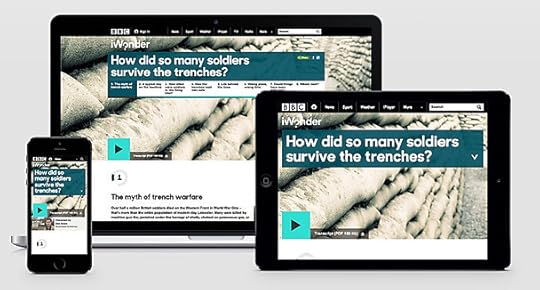
Interactive guides on three screens
A new way to tell stories on the web
Interactive guides take a different approach to presenting content compared to traditional web articles or TV and radio programmes online. They organise video and audio, rich infographics, written summaries, and activities into stories that make the most of our interactive medium. We know from plenty of research that people learn better by doing, and we’ve designed our guides to be “sit forward,” placing a user’s interactions with the content at the core of the experience. Interactive guides take the audience through a series of steps that ask them to look at multiple perspectives of intriguing questions, always with the chance to reflect on the significance of the story at the end.
The initial set of interactive guides mark the start of the World War One season on the BBC and are presented by experts including Dan Snow, Kate Adie, Ian McMillan and Neil Oliver. For more on these read Executive Producer Tim Plyming’s blog post.
A multi-screen modern media landscape
More and more of our audiences are accessing our content via mobile and tablet devices. In fact, for the first time this past Christmas, the proportion of people visiting the BBC Food website from a tablet or smartphone was larger than those visiting from a PC. This trend is set to continue. With the look and feel of “native mobile applications” getting ever more immersive, our audience’s expectations of accessing content on their phones and tablets is high. Expecting our users to struggle to navigate a full “desktop” website on a tiny screen isn’t acceptable any longer.
We all instinctively know that learning is not something that happens at a single time or place only, sitting quietly at a desk or with a PC. Our guides display beautifully no matter what screen size you view them on, accompanying you as you move through your life - at school, home or work, while you're on the go, or while you wait for something else to happen.
To achieve this, our team has employed responsive web design from our first lines of code. With responsive web design, the devil is in the detail. On mobile especially, response times are absolutely crucial. If a web page takes longer than a couple of seconds to load, you’ve already lost a huge percentage of potential browsers. To keep response times down to a minimum, we’ve had to develop a system that loads in just the essential components of the page at the right times. Mobile-sized images download first, then when the page’s Javascript detects the browser’s capabilities, higher-resolution images get ‘loaded in dynamically.’ This can mean the difference of up to a mega-byte’s worth of content for a browser to download. At that page weight, a mobile browser can become agonisingly slow.
For pictures with a dense amount of information on them, such as infographics, it’s important not just to resize a smaller version of a big image, but to load in a completely different image that’s best for that screen. Usually this means a more “zoomed in” view right for mobile. Our system elegantly handles all this image swapping without the user ever noticing. Try reducing the width of your browser window to see it in action at the link above.
We’ve strived for this ‘invisible’ elegance in other places too. For instance, we load in the correct media player for any device behind the scenes, so that visitors on an iPhone don’t get served a Flash player, which won’t work on their Apple device. In this way, everyone should get exactly the same high-quality experience, all the time.
The BBC also has a firm commitment to both web accessibilityand backwards compatibility, making our experiences just as pleasing on older browsers such as Internet Explorer 8 as on newer, more capable web browsers. We’ve taken care to ensure that for users with Javascript turned off, or for those using screen readers, all the content is both available and understandable.
Being able to repeatedly produce immersive experiences
Over the past year or so, many highly engaging web experiences have delighted web audiences, such as the New York Times’ Snowfall story. When our development team first set out to imagine what our interactive guides experience should be, we looked at those examples with a degree of envy. But we also noticed that most seemed to be “one-offs” and didn't work well on mobile devices. We were adamant that we wanted our new format to have all the qualities of this class of highly immersive story - but tailored for every device - whilst being straightforward for our editorial teams to reproduce quickly and repeatedly.
Those were the three main principles which guided our development, and are the reason the iWonder interactive guides represent such a giant leap forward in the BBC's ability to inspire and support learning. Our editorial colleagues now have a toolkit that lets them to put together and publish these rich stories in hours or days, rather than the weeks that it might have taken just a year or so ago. And whereas in the past, each rich story experience would require its own bespoke code and design, there's now just one codebase to maintain and add features to.
In the coming months, we’re adding a collection of activities that will sit within the guide format's sequence of ‘steps’. Look out for visual quizzes, clickable infographics, and plenty of other digital toys to play with, as the library of options available to our production team grows.
I'd love you to know what you think, so please do leave a comment.
Andy Pipes is Executive Product Manager, Knowledge and Learning
January 17, 2014
What's on BBC Red Button 18-24 January
Nature lovers are in for a treat this week as we present Winterwatch live from the Scottish Highlands, starring our native wildlife as it faces up to the extremes of the season. There’s also skiing events and the Skeleton World Cup from Switzerland, and Championship Indoor Bowls live.
Winterwatch
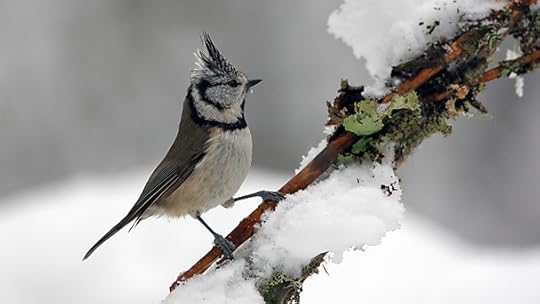
Large crested tit
In a new, live, interactive show, Winterwatch builds up to the world's largest citizen science project, the RSPB Garden Birdwatch.
Join Iolo Williams, Euan McIlwraith, Richard Taylor-Jones and Nick Baker with live cameras around the UK, from dawn to dusk each day. This will feature live reports from cameramen in the field, live wildlife scenes filmed on remote cameras, interviews and more.
The wildlife footage will be streamed online, on tablets, smartphones and on BBC Red Button, and it’s accompanied by running commentary from our guest experts.
Mon 20 Jan, 9am-10am, 12pm noon-10:25pm
Tue 21 Jan, 4am-7am, 9am-10am, 12 noon-7am Wed 22 Jan
Wed 22 Jan, 9am-10am, 12pm noon-7:55pm
Thu 23 Jan, 12am midnight-1:55am, 4am-7am, 9am-10am, 12pm noon-7am Fri 24 Jan
Fri 24 Jan, 9am-10am, 12pm noon-1:25am Sat 25 Jan
Sat 25 Jan, 4:30am-6am
Sport highlights this week
Final Score and the Football League Show take their usual slots on Saturday and there’s more winter sports action with the men’s slalom skiing from Wengen, Switzerland and the Skeleton World Cup in St. Moritz. From Monday, we head to Great Yarmouth for a week of live World Indoor Bowls coverage.
For a full list and times of sport coverage on the Red Button see the BBC Sport website. Please note times are subject to change.
Extra from BBC Three's Uncle
Watch the music video of ‘No Survivors’ in full - a treat from BBC 3’s new comedy about rambunctious, immature Andy and his relationship with his smart and levelling Nephew, Errol.
Mon 20 Jan, 10:25pm-4am Tue 21 Jan
Thu 23 Jan, 1:55am-4am Fri 24 Jan
Sat 25 Jan, 1:25am-4:30am Sun 26 Jan
Crimewatch
Crimewatch needs your help to track down wanted faces. Your first chance to view and report people wanted by police before the main Crimewatch programme. Will you recognise anyone?
Wed 22nd Jan, 7:55pm-12am midnight
You can keep up with all the latest news by following us on Twitter @BBCRedButton
January 16, 2014
College of Production round up: podcasts, dual screens and sound quality
The BBC College of Production (CoP) website is a free online learning resource for the radio, television and online production communities offering videos, podcasts and articles from broadcasting innovators and experts.
The podcast is a staple of many websites, in fact, it’s one of the most popular weekly features for the College of Production. Bringing niche audio content to niche audiences on multiple platforms and devices, podcasts can bring an audience closer to your content in very immediate ways.
But what exactly is it that makes a podcast a podcast? Much like the hugely successful Gogglebox, where TV viewers watch TV viewers watching TV, we recorded a podcast to investigate the secret art of podcasting.
The market is huge and tricky to crack – as one guest pointed out, "They've got the whole of the internet to play with so if they're listening to you then you're really very lucky." So what do podcasts really offer content producers, and does a format that allows fans to subscribe and download audio onto their portable device somehow change or influence the way a podcast episode is put together? We offer some suggestions.

Stargazing Live
As programmes like Stargazing Live, Doctor Who and Sherlock have shown, it’s no longer enough to just have an idea for a single screen. Making your show shine on screen today means you have to make it bigger than its original concept.
Now apps, social media and games can help producers connect with audiences in different and deeper ways and ultimately make their programme stand out. A programme’s success owes much to the producers who think beyond the small screen, using multiplatform elements to initiate, build or improve their content and make their shows bigger.
In this article, we discussed how the success of your content owes much to being able to connect linear, digital and real world experiences - more ‘built in’ not ‘bolt on’ – and in a truly multiplatform and multi device world, being able to move an audience from one screen to another.
You might watch Strictly on your tablet or Sherlock on your PC, but viewing online rather than on TV doesn't mean the sound quality should be any less than you'd expect from a show with high production values. Sound is a massive issue for audiences. It’s a huge bug bear for sound engineers, and the single biggest topic of viewer complaints. With more broadcasters, channels and production houses offering a vast array of programmes across different platforms, it can all add up to a very disconcerting audience experience.
But this is all due to change, as new guidelines are being introduced which mean that all programme sound should be mixed to the same standard. And the BBC Academy will be presenting a series of events around the UK to raise awareness of these issues in a series of events for BBC staff, indies, freelancers and external suppliers. We’ll be covering events on our site, including a podcast with sound mixers and audio specialists, so watch this space for further updates.
Finally, we closed a very busy year with a very hot topic, using our regular Twitter Q&A to discuss working for free.
Community media volunteering, internships, work experience – whether paid or unpaid, they can all help you get your foot in the door. But if you’re just starting out, how do you make sure you’re being useful and being fairly treated?
Lively and contentious questions were fielded on Twitter, with answers supplied live by Bectu, BBC HR as well as recruitment and talent managers from the BBC Academy. As always, we used Storify to record the conversation, tips and helpful links – a really great example of how the power of social media can be harnessed to share experience across the industry.
Denise Roach is Content Producer, BBC College of Production
BBC's Blog
- BBC's profile
- 28 followers



